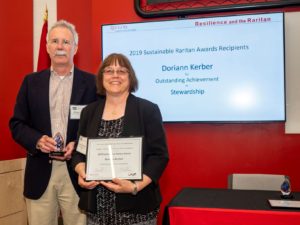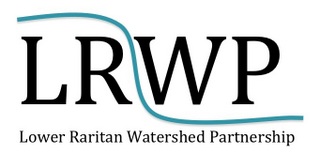Meet LRWP Board Member Doriann Kerber!
Interview by April Callahan, Rutgers Raritan Scholar
Doriann Kerber is Councilwoman for the Borough of Milltown, NJ, and serves as Treasurer for the Middlesex County Water Resources Association. She is also active with Jersey Water Works, and with the Milltown and East Brunswick Green Teams. She took time out of her busy schedule for an interview about Green Infrastructure outreach in the watershed, and her vision for improving environmental education to benefit the health of our watershed communities.

AC: Where are you from in the Lower Raritan Watershed? In your time here, how have you engaged in and explored the area?
DK: I am from Milltown and we have a sub-watershed, Lawrence Brook Watershed, that I enjoy exploring. In 2014 I volunteered to be on the Middlesex Water Resources Association and I heard about the Lower Raritan Watershed Partnership. I feel strongly about cleaning up the waterways just like anyone else in my town, and feel that we should all take part in caring for our waterways. I got involved with the LRWP to do just that.
AC: What, in your opinion, are the primary issues that need to be addressed in the watershed?
DK: Continuous cleanups are important for all areas of the watershed. Every town in the watershed should have annual clean-ups! And education/outreach is so important. We need folks to understand that the land use choices they make, that their consumption and disposal choices affect their water and environment. If they want cleaner water and a better quality of life, then they need to make good choices and help take care of our waterways.
AC: What is your vision for the LRWP?
DK: I will be assisting with cleanups, but also helping with outreach events. I want the organization to get more media coverage, more speaking engagements, and attract more people from all walks of life to enjoy bicycling, walking, our natural spaces.
AC: I understand you are training with Rutgers Cooperative Extension to deliver Green Infrastructure outreach for area municipalities. Can you tell me more about that?
DK: Rutgers Cooperative Extension offers a “Green Infrastructure Champion” training Program, which I went through. This training allows me to be able to assess green infrastructure in towns and municipalities. For example, I met with the General Manager of the Brunswick Square Mall to discuss stormwater management improvements that will also make the area more attractive. I have training to assist four different groups: resident, commercial, government and nonprofit. In addition to working in Milltown and East Brunswick I can work throughout Middlesex County and the Lower Raritan Watershed.
AC: What do you see as the most important actions Town Council members can take in their home communities to improve overall watershed health?
DK: Environmental education and outreach is so important. We need Town Councils to show how everybody plays a part in improving watershed health, and give them the tools and know-how to make a difference. It’s not just the town, or the water treatment center, or the wastewater treatment center that is responsible for water management. Everybody plays a role!
AC: Is there anything else you would like to add?
DK: I think the Lower Raritan Watershed Partnership has really grown in the last four years. I want it to be recognized throughout the county and throughout the state, and hope that the work we do will get more people involved in their local watersheds.
